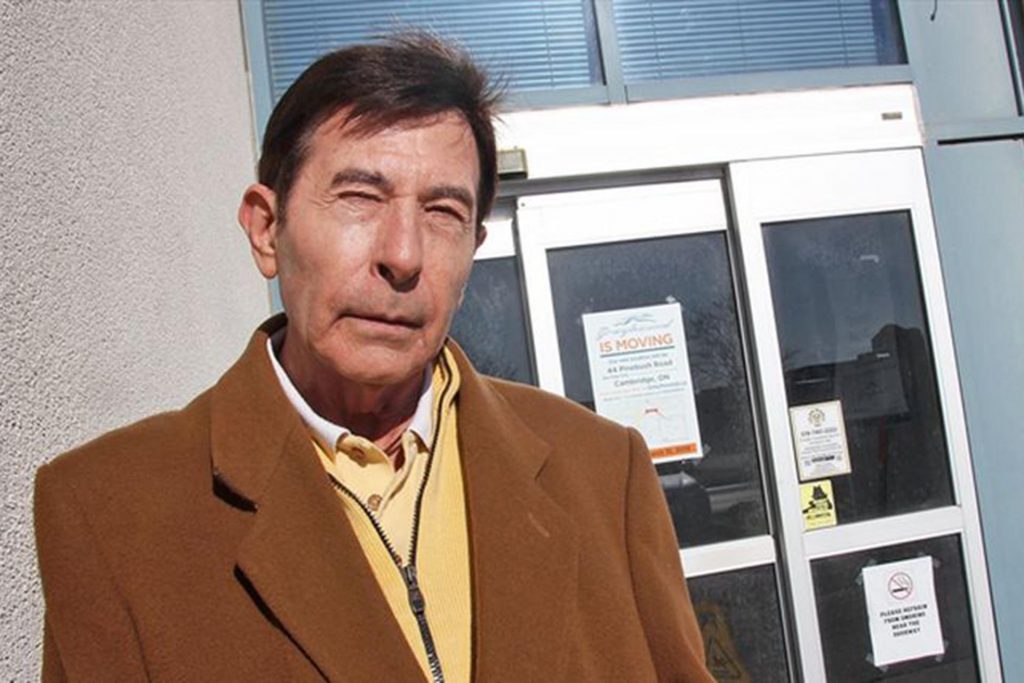Gordon McIvor is chilly to the idea of Greyhound bus services closing its Industrial Road facility and moving to a bus stop on Pinebush Road.
On March 31, Greyhound will close its current location at 1139 Industrial Rd. Unit 3 — and on April 1, will be making stops at the Grand River Transit bus stop at 44 Pinebush Rd., behind The Keg restaurant.
Tickets can only be purchased online at greyhound.ca.
Crystal Booker, the communication specialist for Greyhound Lines Inc., said in an email to the Times that the indoor station was unnecessary as most passengers are commuters and students, which “limits the need for a large, indoor location.”
“Greyhound’s new location will provide seamless access to other valuable forms of transportation, including GO and GRT, making the change more convenient for customers,” Booker said, noting that she doesn’t see the change affecting passengers taking longer trips.
“Greyhound has shifted its focus towards short distance travel as today’s customer sees the value in a day or weekend trips that are closer to home, as well as commuter routes. Customers will still be able to bring luggage.”
Parcels, however, will now have to be shipped out of the Guelph, Brantford, or Hamilton Greyhound station.
McIvor, who uses Greyhound every Saturday to go to Toronto, said he understands how business works and knows that streamlining has to happen to make sure a company doesn’t lose money — especially in Cambridge, which is basically a stop on a route between bigger cities. He also has no problem with the bus stop being moved to behind The Keg, which is less than five minutes down the road from the current location.
What McIvor takes exception to is that Greyhound is often late: usually, he says, as little as 20 minutes, but often close to an hour. That, again, he said isn’t the crux of the issue, as it comes with weekend traffic on Highway 401, especially if there is an accident. But when winter comes, having 10 to 20 riders trying to fit in an unheated shelter for up to an hour — that’s where he gets upset.
“So literally, they are forcing a ton of people to stand in the cold for an hour or more every time they take the bus,” he said, which isn’t comfortable for a senior like himself and others that take the bus.
“Now I’m thinking that they will discover very quickly that we will find another way to get to Toronto if that happens.”
McIvor said Greyhound was “clever” in corresponding the move in the spring, which will mitigate backlash from the public; but come winter, especially with the winter Ontario just had, he said, it will be a whole different situation.
“Believe me, even if I went out to check if the bus is coming in January and February when it’s like 20 (degrees) below, it’s bloody cold. You want to get back inside as you can, and that’s not going to be an option,” he said.
To combat that, McIvor is hoping Greyhound will build a heated enclosure for the winter months that would accommodate about 15 people. He has started a petition to make it happen but admits that he’s only trying to get signatures when he is at the terminal prior to boarding the Saturday bus.
He added that Greyhound could use the money they’ll save from laying off all the staff in Cambridge and closing the current facility.
“My petition will be underwhelming to Greyhound,” he said.
“I spent my life in real estate and infrastructure, so I know exactly how much that would represent as far as an investment. It would be a fraction of what the terminal that they’re closing is going to save. Just in the name of decency.
“I did call into their public relations department corporately and found someone that was willing to take notes and listen to my sad little tale, and actually did a pretty good report that they said they would be sent to senior management on my behalf. So at least they’re going to be aware that people in Cambridge aren’t happy with this.”
Asked if there is a heated shelter in the works for Cambridge, Booker said, “At this time we are not aware of any changes that will be made.”


